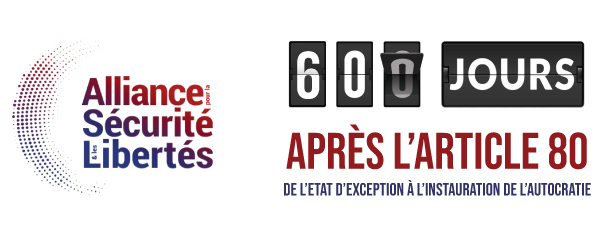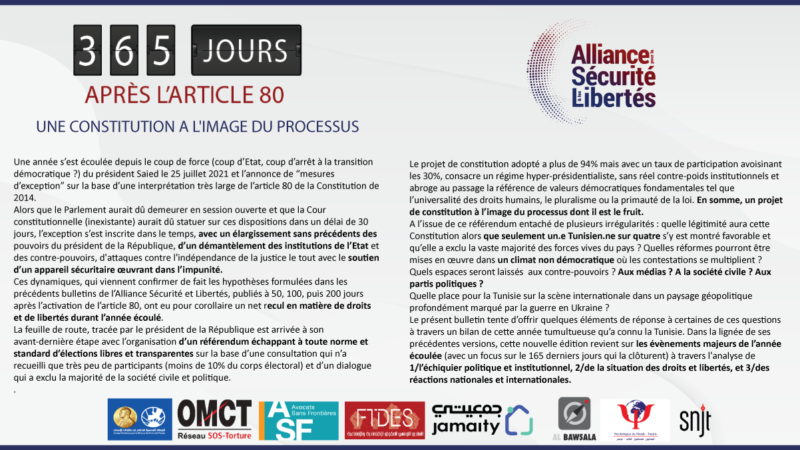Report – 600 days after article 80
The Alliance for Security and Liberties (ASL) has recently released its 5th report, focusing on the rule of law and the state of freedoms in Tunisia, following the 25 of July 2021 decisions. Initiated in response to President Saïed’s coup de force, this report provides a comprehensive analysis of the subsequent events, decisions, and reactions, particularly following the contentious vote on the new Tunisian Constitution on July 25th, 2022
In the wake of President Saïed’s activation of Article 80 of the Constitution and the declaration of a state of exception, the dismantling of institutions that emerged during the post-2011 transition began. This included the freezing and subsequent dissolution of parliament, the dissolution of constitutional bodies, the exercise of full powers through decrees, and the ratification of a Constitution unilaterally drafted by Saïed and voted upon under questionable circumstances.
The contents of this bulletin leave little doubt about President Saïed’s authoritarian intentions and his determined aim to definitively conclude Tunisia’s democratic transition. Through his unilateral imposition of a political project, the details of which remain unclear, but undeniably characterized as top-down, authoritarian, and populist in nature.
ASL’s monitoring and analysis work reveal several notable tendencies and developments.
At the institutional level, the period was marked by the adoption the new Constitution, which resulted in a concentration of power in the executive branch at the expense of the legislative and judicial powers. The electoral process leading up to the Constitution vote and the election of the first chamber of Parliament were marred by non-compliance with electoral norms and historically low turnout rates. Simultaneously, the judiciary continued to face attacks and dismantlement amidst a major socio-economic crisis.
Furthermore, there has been a continuous erosion of rights and freedoms, with the judiciary and security apparatus being exploited as tools to prosecute dissent, while opposition members, press, and trade unions face repression. Arbitrary administrative measures and the adoption of oppressive decree-laws have become commonplace. Recent months have witnessed a surge in racist violence, fueled by the state’s hateful rhetoric and practice against sub-Saharan populations, occurring alongside an increasing number of Tunisian and non-Tunisian migrants that continue to risk their lives to reach Europe by sea.
The grip on the opposition, that struggles to present a united front against the regime, has tightened even further. The political landscape remains unstable and in flux, with various civil and political opposition initiatives coexisting but failing to form a cohesive force capable of challenging the President’s authoritarian plans, while some of the Presidents’ allies are distancing themselves.
On the international stage, Tunisia is increasingly isolating itself. The recent wave of arrests targeting public figures and the xenophobic discourse against sub-Saharan migrants has resulted in repeated condemnations, with the intensity of international criticism growing. In light of these circumstances, the President is engaged in diplomatic efforts, particularly with Arab states, seeking new allies.
The Alliance for Security and Liberties (ASL) is an alliance of Tunisian and international civil society organizations based in Tunisia. In line with the spirit of the Revolution for Freedom and Dignity, ASL reflects, mobilizes, and takes action to ensure that Tunisia consolidates the construction of a democratic state where public policies serve its citizens, guaranteeing peace, respect for human rights, and equality for all.
ASL has already published four periodic bulletins, marking the progress made 50, 100, 200, and 365 days after July 25th, 2021.




